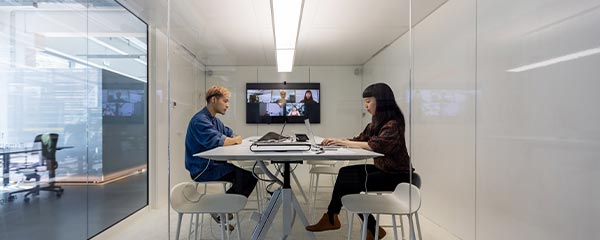Hybrid work offers new perks for individual workers, but what about team productivity?
The future of team productivity for most remote-capable workers depends on learning to collaborate more effectively in a hybrid workplace.
When teams are physically distanced and on different schedules, teamwork is harder to coordinate, and productive partnerships are more difficult to cultivate.
Gallup research from a nationally representative study of 2,877 hybrid workers in the U.S. reveals opportunities for improvement in the plans, practices, feedback, and training of hybrid teams.
Employers can help boost hybrid teams’ productivity through four steps based on this research:
1. Plan for Success
Half of hybrid workers (48%) are on a team that has not discussed an informal or formal plan for how to collaborate effectively in a hybrid environment.
Organizationwide hybrid work policies that define when employees can work from home are vital to setting clear expectations for remote working. However, policies alone do not foster strong teamwork and organizational cultures.
“It takes work to get people to interact in the office. It’s not purely organic. Structure and planned activity is needed,” one highly engaged manager told Gallup.
Hybrid teams need a plan for working together effectively. A plan helps teammates know what to expect from each other and what is expected of them. It also balances team needs in an environment where individual autonomy can overrun priorities that aren’t explicitly defined.
While half of hybrid workers do not have an agreed-on plan for navigating hybrid teamwork, those who do experience improvement in both team collaboration and their own engagement at work. Having a plan for hybrid collaboration results in employees being:
- 2.2 times as likely to say their organization’s hybrid policy has an extremely positive impact on their team’s collaboration
- 66% more likely to be engaged at work
- 29% less likely to be burned out
Individual contributors are more likely to be without a plan for hybrid collaboration (51% no plan) than their managers (46%) and leaders (39%), showing gaps in how well hybrid work is arranged throughout organizations. These disparities may also reflect how roles requiring complex levels of leadership collaboration are especially in need of well-orchestrated hybrid teamwork.
Often referred to as “team charters,” plans for hybrid teamwork should include the team’s agreed on mission, goals, strengths and ways of working.
2. Coordinate Hybrid Collaboration
What should a hybrid teamwork plan include?
Among workers whose team has a plan for improving hybrid collaboration, the following practices are most commonly used, with all of them showing some benefit to employee engagement.
Regularly scheduled team check-in meetings (67%) top the list of best practices, indicating that two-thirds (67%) of hybrid workers whose team has a plan for hybrid collaboration have the opportunity to optimize how they coordinate work with their teammates.
Given that the majority of hybrid workers report having this opportunity to connect regularly with teammates, the follow-up question becomes, “What should we discuss during team meetings?”
The next most common practices are having guidelines for when to be available during working hours (62%) and guidelines for communicating periods of unavailability (50%). Of all the practices studied, these two guidelines have the greatest impact on how much a team’s hybrid policy improves its collaboration.
Somewhat less prevalent are guidelines for how often to work on-site (44%) and guidelines for which specific days they need to be on-site (34%). Individuals who said their team follows these practices primarily report that they were set by their organization, based on responses to a separate survey item asking about the nature of their team’s hybrid policy. These findings indicate that hybrid teams are not typically adding their own on-site attendance requirements beyond organizationwide policies.
The least common practice is providing guidelines for prioritizing specific activities to focus on while on-site (29%). This is a significant opportunity for improvement, given Gallup’s previous research demonstrating the benefits of using on-site time to focus on activities that are harder when physically apart such as collaboration, feedback and team building.
It can be discouraging to come into the office and spend the day alone. Gallup’s current study builds on previous research by showing that guidelines for prioritizing certain high-value activities while working on-site were more likely to increase hybrid workers’ engagement than any other practice examined.
3. Reflect and Adapt
Plans and best practices have limited effect until they become part of a team’s routine. While regular team check-ins are often used to coordinate the logistics of hybrid work, teams must also reflect on lessons learned and how team members can work together better going forward.
As such, we asked hybrid workers how often their team meets to discuss hybrid work and how to improve it.
Among workers whose team has a plan for hybrid collaboration, 22% have weekly or monthly discussions about hybrid teamwork, 36% have periodic discussions quarterly or a few times per year, and 42% have discussions annually, less than annually, or never.
In other words, three in five hybrid workers have some form of ongoing discussions throughout the year about improving hybrid teamwork, which translates to 84% better team collaboration and 50% higher employee engagement. Through routine feedback and problem solving, these hybrid teams learn to reflect and adapt together.
As one hybrid worker shared, “Having regular standing in-person meetings weekly or monthly is helpful for building rapport and opportunities for collaboration.”
In contrast, two in five hybrid workers only discuss hybrid teamwork once a year or less, which causes them to primarily focus on aligning their work habits to their preferred workstyle with little attention to how this personal flexibility affects their team’s effectiveness.
For hybrid teams that do not have a hybrid plan in the first place -- which is about half of hybrid workers -- discussions about how to improve hybrid teamwork are rare. Seventy-five percent of individuals on these teams without a plan report discussing hybrid teamwork once a year or less.
Put simply: No plan for elevating teamwork means no improvement for hybrid teams.
4. Upskill
Currently, only 21% of hybrid workers have received required or optional training for how to work effectively in a hybrid work environment. The managers who lead these individuals are not much better off: Just 28% of hybrid managers are trained by their organization to lead a hybrid team.
Plans and best practices for elevating teamwork are more effective when organizations teach people how to work differently. Hybrid workers need to individually and collectively learn how to make the most of hybrid work while adapting to its challenges.
If leaders want their hybrid teams to succeed, they must be trained to work together more effectively in a hybrid environment. And this upskilling for hybrid workers should start with training and supporting their managers.
Gallup finds that having an effective manager leads to four times higher employee engagement and wellbeing, regardless of how often they work remotely.
Re-Imagine Hybrid Teamwork
Hybrid teams can be high-performing teams, but they need guidance and training. Gallup’s research highlights what the best hybrid teams do differently: Both team members and managers receive training on collaborating in a hybrid environment. The team creates a charter -- distinct from corporate policy -- that defines how members best work together. Team members meet regularly and clearly communicate about their availability. When on-site, they prioritize collaboration and team-building activities. Finally, they schedule ongoing check-ins to evaluate and improve their hybrid work experience.
None of this happens organically, especially as team members change roles and cross-functional collaboration adds complexities for matrixed teams. It’s ultimately up to leaders to make hybrid teams work. The productivity of tomorrow’s hybrid workforce depends on it.
Equip your teams to thrive in a hybrid work environment.
- Learn more about leading successful hybrid teams.
- Discover the value of developing a strong workplace value proposition.
- Monitor hybrid workplace trends that could affect your organization.




